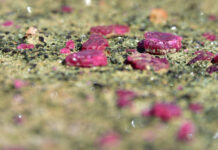
[miningmx.com] — The diamond industry, under scrutiny after supermodel Naomi Campbell’s war crimes testimony and a crisis in Zimbabwe, must take decisive measures to avoid a potential return of conflict diamonds, campaigners say.
The sale of diamonds funded wars in Sierra Leone, Liberia and Angola for years. Under mounting public pressure to clean up its act at the end of the 1990s, the industry set up a global certification scheme in 2003 to eradicate conflict diamonds.
Although it reduced the number of conflict diamonds to less than 1% of global volumes from about 15%, lobby groups say there are still holes in the system in Zimbabwe and Ivory Coast, and Venezuela is not part of the scheme.
“Weaknesses in implementation, lack of political will among member governments and imperfect oversight and enforcement mean that problems still persist,” said Elly Harrowell at Global Witness, which campaigns against the trade in illegal diamonds.“No one can be 100% sure that they are buying a ‘conflict free’ diamond.”
Conflict or “blood diamonds” are gems mined in war zones.
Human rights worries in Zimbabwe have sharpened tension in the industry, with state security forces accused of killing hundreds of the more than 30 000 illegal diggers who descended on its Marange diamond fields in 2006.
A compromise deal in July averted a crisis in the Kimberley Process – the global certification scheme that monitors diamond trades – and allowed for a resumption in diamond sales from the Marange fields, one of the largest finds in history.
Nadim Kara, at Partnership Africa Canada (PAC), which monitors the Kimberley Process, said the real test was still to come in Zimbabwe.
“In a way there is political will from some countries to keep Zimbabwe’s heels to the fire, but that political will is being sapped by the incredible economic potential,” he said.
Kara said much hinged on a review in September and PAC wants to see evidence of clear instructions being given to the military and police not to engage in illegal mining or smuggling and the granting of mining concessions to ordinary Zimbabweans.
Some jewellers, however, are still worried.
“We are very conscious and aware of the situation and it is something we take very seriously and are in discussions about the best way forward,” said Simon Rainer, CEO of the British Jewellers’ Association.
Urgent reforms
Appearing as a witness at the war crimes trial of former Liberian President Charles Taylor in The Hague, British supermodel Naomi Campbell said she received “dirty looking pebbles” from two men during a charity trip to South Africa in 1997.
Campaigners welcomed her testimony, arguing the industry is still plagued by the trade in illicit diamonds, but some experts have cast doubt on the blood diamond trade and argue the Kimberley Process cannot possibly trace every gem.
In an opinion article to the Wall Street Journal, independent rough diamond consultant Jack Jolis said diamonds and war in Africa were not related, and certainly not more so than any other commercial commodity found on the continent.
“Most African diamonds are produced in places that are reasonably-to-perfectly peaceful (such as Botswana, Namibia and South Africa) whereas there are murderous African conflicts that rage elsewhere without the slightest ‘assistance’ from diamonds (such as Rwanda, Uganda and Sudan),” Jolis wrote.
And diamonds are not the only commodity misused.
A UN report estimates that in the past 60 years, at least 40% of civil wars were connected to natural resources such as timber, diamonds, gold, minerals and oil or control of scarce resources such as fertile land and water.
World Diamond Council president Eli Izhakoff said the flow of illicit diamonds was now less than 0.2% of global volumes. “I think that’s a wonderful thing.
Virtually today there are no conflict diamonds traded,” Izhakoff said.
But New York-based diamond trading company Rapaport urged its members this month against trading in Zimbabwe diamonds, warning any breach would result in expulsion from its network.
“There is no guarantee that diamonds with KP certifications are free of associations with human rights violations,” it said.
Campaigners also say illicit diamonds – diamonds traded without certification – are making a comeback in Sierra Leone, Liberia, Ivory Coast and Venezuela and, together with the World Diamond Council, are calling for urgent reform of the Kimberley Process.
The proposals are to be discussed at a meeting in November and include introducing majority voting to avoid vetoes to the current consensus-decision making, full-time staffing, improved monitoring and publication of its reports and actions.
And unless reform is made, PAC’s Kara said the lack of accountability and follow-up risked a return to the problematic past. “Conflict diamonds are just around the corner,” he warned.










